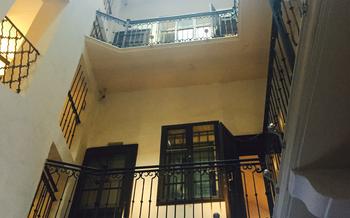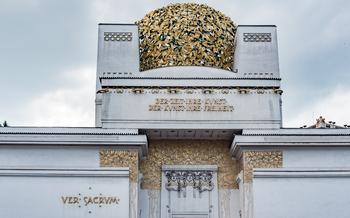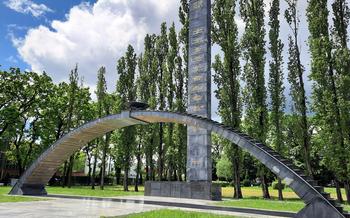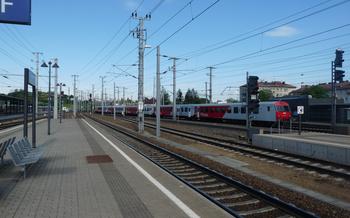
Museum of Contraception and Abortion
- The Museum of Contraception and Abortion
- Abortion
- Social Impact
- Reproductive Rights
- Education and Awareness
- Guided Tours
- Research and Publications:
- Accessibility:
- Museum Shop:
- Events and Workshops:
- Insider Tip: Contraception and Abortion Day
The Museum of Contraception and Abortion
Nestled in the vibrant city of Vienna, Austria, lies a unique institution—the Museum of Contraception and Abortion. This groundbreaking museum is dedicated to shedding light on the often-overlooked history and social significance of contraception and abortion. Established in 2002, it has become a renowned destination for those seeking to deepen their understanding of reproductive health and rights.
Located in the heart of Vienna's bustling Währinger Straße, the museum invites visitors to embark on a thought-provoking journey through the evolution of contraceptive practices and the fight for reproductive freedom. As you step through its doors, you will be greeted by a welcoming atmosphere that fosters open dialogue and encourages critical thinking about these essential issues.
Abortion
The Museum of Contraception and Abortion delves into the complex and often controversial topic of abortion. It presents a comprehensive overview of the legal, ethical, and medical aspects of abortion, shedding light on its history, legal frameworks, and current debates. Visitors can explore the history of abortion laws in Austria, from the strict prohibitions of the past to the more liberalized laws of today. They can also learn about the medical procedures involved in abortion and the associated risks and complications.
The museum encourages visitors to critically examine the ethical considerations surrounding abortion, exploring different perspectives and viewpoints. It presents a balanced approach, allowing visitors to form their own opinions on this sensitive and highly debated topic. Through interactive exhibits and thought-provoking displays, the museum aims to foster informed discussions and promote a deeper understanding of the complexities of abortion.
Social Impact
The Museum of Contraception and Abortion sheds light on the profound societal impact of contraception and abortion on women's rights, reproductive health, and family planning. Contraception has played a crucial role in empowering women to control their fertility, pursue education and careers, and participate fully in society. Abortion, while often a contentious issue, is essential for women's autonomy and the ability to make decisions about their own bodies and lives.
The museum's exhibits explore the ways in which contraception and abortion have transformed the lives of women and families, both historically and in contemporary society. Visitors can learn about the social and cultural factors that have influenced attitudes towards reproductive choices, as well as the ongoing debates and controversies surrounding these issues.
The museum also highlights the importance of access to comprehensive reproductive health care, including contraception and safe abortion services. It demonstrates how lack of access to these services can have detrimental consequences for women's health, well-being, and ability to achieve their full potential.
Through its exhibits and educational programs, the Museum of Contraception and Abortion aims to foster a greater understanding of the social impact of reproductive choices and to promote reproductive rights and justice for all.
Reproductive Rights
The Museum of Contraception and Abortion sheds light on the fight for reproductive rights in Austria and across the globe. Visitors can delve into the history of reproductive rights movements, exploring the challenges and triumphs in promoting access to contraception and safe abortion services. The museum highlights the role of activists, organizations, and individuals who have dedicated their efforts to ensuring reproductive freedom and autonomy for all. Through interactive exhibits and informative displays, visitors gain a deeper understanding of the ongoing struggle for reproductive justice and the importance of advocating for the rights of women and individuals to make informed choices about their bodies and reproductive health.
Education and Awareness
The Museum of Contraception and Abortion recognizes the importance of education and awareness in promoting reproductive health. Through its various educational programs and initiatives, the museum aims to foster knowledge and understanding about contraception, abortion, and related issues.
The museum offers guided tours led by experts in the field of reproductive health and history. These tours provide visitors with a deeper understanding of the exhibits and their historical context. Additionally, the museum organizes workshops, lectures, and events that explore specific topics related to contraception and abortion. These events offer participants the opportunity to learn from experts, engage in discussions, and network with like-minded individuals.
The museum also has a comprehensive educational website that provides information on a wide range of topics related to contraception and abortion. The website includes articles, videos, and interactive resources that are designed to inform and educate visitors. The museum's educational materials are available in multiple languages, making them accessible to a diverse audience.
By promoting education and awareness, the Museum of Contraception and Abortion empowers individuals to make informed decisions about their reproductive health. The museum's educational programs and initiatives contribute to a more informed and compassionate society where reproductive rights are respected and protected.
Guided Tours
To enhance your experience at the Museum of Contraception and Abortion, don't miss the opportunity to join a guided tour. Led by knowledgeable experts in reproductive health and history, these guided tours provide a deeper understanding of the exhibits and their historical context.
During the tour, you will gain insights into the evolution of contraceptive methods, the fight for reproductive rights, and the societal impact of contraception and abortion. The guides will share fascinating stories and anecdotes, shedding light on the personal experiences and struggles of those who have been affected by these issues.
By participating in a guided tour, you will have the chance to ask questions, engage in discussions, and clarify any doubts you may have. The guides are well-equipped to provide accurate and up-to-date information, ensuring that you leave the museum with a comprehensive understanding of the topics covered.
Whether you are a history buff, a student, a healthcare professional, or simply someone interested in reproductive health, the guided tours at the Museum of Contraception and Abortion offer an enriching and educational experience. Remember to book your tour in advance to avoid disappointment, as they tend to fill up quickly.
Research and Publications:
The Museum of Contraception and Abortion is not only a place to learn about the history and social significance of contraception and abortion but also a center for research and scholarship. The museum's research team, composed of historians, sociologists, and medical professionals, delves into various aspects of reproductive health and history. Their findings are disseminated through scholarly articles, reports, and books published by the museum.
The museum's publications cover a wide range of topics, including the history of contraception and abortion laws, the development of contraceptive technologies, the impact of reproductive rights on women's lives, and the cultural and religious influences on reproductive choices. These publications are a valuable resource for researchers, policymakers, and anyone interested in the field of reproductive health.
By engaging in research and publishing scholarly work, the Museum of Contraception and Abortion contributes to the advancement of knowledge in the field and promotes evidence-based decision-making in reproductive health policy and practice.
Accessibility:
The Museum of Contraception and Abortion is committed to providing an accessible and inclusive environment for all visitors. The museum is wheelchair accessible, with ramps and elevators available to reach all floors. Assisted listening devices are available for visitors with hearing impairments. The museum also offers guided tours in sign language for visitors who are deaf or hard of hearing. For visitors with visual impairments, the museum provides audio tours and tactile exhibits. Additionally, the museum has staff members who are trained to assist visitors with disabilities. Visitors with disabilities are encouraged to contact the museum in advance to make any necessary arrangements. The museum's website also provides information about accessible transportation options and nearby accessible parking.
Museum Shop:
After exploring the exhibits and expanding your knowledge of contraception and abortion, head to the museum shop for a unique shopping experience. Discover a curated selection of books, souvenirs, and educational materials related to reproductive health. Find insightful publications written by experts in the field, including books on the history of contraception, abortion laws, and reproductive rights. Browse through a variety of souvenirs, such as tote bags, postcards, and magnets, featuring thought-provoking designs and messages related to reproductive health. The museum shop also offers a range of educational materials, including booklets, posters, and DVDs, designed to promote awareness and understanding of contraception and abortion. Whether you're looking for a gift for yourself or a loved one, or simply want to expand your knowledge further, the museum shop has something for everyone.
Events and Workshops:
The Museum of Contraception and Abortion offers a variety of events, workshops, and lectures throughout the year, providing a platform for learning, discussion, and engagement on various topics related to reproductive health. These events are an excellent opportunity to delve deeper into specific issues, interact with experts in the field, and connect with like-minded individuals who share your interests. From discussions on the latest developments in contraception to workshops on reproductive rights advocacy, the museum's events offer a dynamic and interactive way to expand your knowledge and understanding of reproductive health. Be sure to check the museum's website or social media pages for upcoming events and workshops to make the most of your visit.
Insider Tip: Contraception and Abortion Day
For an immersive and enriching experience, plan your visit to the Museum of Contraception and Abortion to coincide with the annual "Contraception and Abortion Day." This special event, held once a year, transforms the museum into a hub of activities, exhibitions, and discussions dedicated to reproductive health. Visitors can delve deeper into the museum's collection, engage with experts in the field, and participate in thought-provoking workshops and lectures. It's an exceptional opportunity to gain a comprehensive understanding of contraception and abortion, their history, and their impact on society. Mark your calendars and don't miss this chance to immerse yourself in the world of reproductive health and rights.









